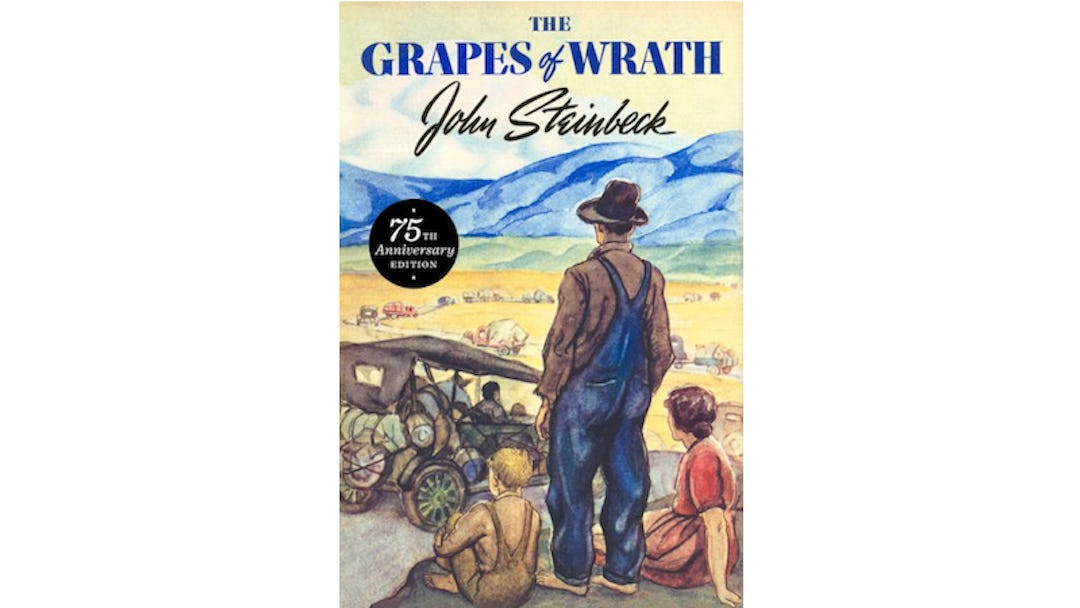Unless you happen to have a trust fund that’s paying for your nicely renovated loft, then being broke is something of an occupational hazard when you’re living in a city like NYC. But if, like us, you’re trapped in a constant cycle of wondering exactly how you’re going to meet this month’s rent, then rejoice — you can always look to the world of literature to find someone who’s worse off than you! In all seriousness, though, there have been some truly magnificent novels written about the penury and deprivation that can arise in allegedly first-world societies, books that are crushingly depressing but also with a lot to teach about the way our world treats those who have less than we do. Here are some of our favorites.
George Orwell — Keep the Aspidistra Flying
Down and Out in Paris and London is the obvious choice here, but at least there’s a vague modicum of romance in Orwell’s adventures as a plongeur and, um, a tramp. There’s no such thing in Keep the Aspidistra Flying, only a dismal inexorability to everything that befalls aspiring poet and main protagonist Gordon Comstock. Even when he manages to get his hands on some cash, he makes a mess of things by drinking it all away — and eventually, the result is that either he compromises what he perceives to be his principles by returning to suit-wearing dronedom, or he starves to death. Cheery, eh?
Knut Hamsun — Hunger
Hunger shares a lot with Orwell’s work — not least, that its protagonist is an aspiring writer who’s slowly starving to death. Like Comstock, Hamsun’s hero has a broad streak of self-destructiveness, although there’s also a poetic, hallucinogenic quality to Hamsun’s writing that’s absent from Orwell’s relentless realism. Either way, unless you’re actually contemplating eating your pencil (honestly, that’s how bad it gets for Hunger‘s protagonist), it’s not that bad yet.
Charles Bukowski — Ham on Rye
Whereas the likes of Post Office and Factotum intersperse their tales of alcoholic penury with moments of alcoholic hilarity, Ham on Rye — Bukowski’s memoir of his childhood, which was spent in the company of an abusive father, a victimized mother, and absolutely no money at all — is pretty much unrelentingly grim. Sure, Bukowski ended up as a notorious alcoholic and occasionally abusive womanizer, but reading about his early years, it’s a wonder that he managed to become even a remotely functional human being.
John Steinbeck — The Grapes of Wrath
A classic of impoverished misery! Steinbeck’s dust-bowl tour de force is just as powerful and moving in 2011 as it was in 1939, and we suggest that lawmakers in Arizona and Georgia might want to examine its depiction of how migrant laborers are dehumanized and treated as disposable commodities. But politics aside, The Grapes of Wrath is also a simple portrait of poverty and the crushing effect it has on those who endure it — just like the 14.3 percent of Americans who, as of the 2009 census, lived below the official poverty line.
Carson McCullers — The Heart Is a Lonely Hunter
From around the same time as The Grapes of Wrath, The Heart Is a Lonely Hunter is arguably more about social exclusion and alienation than it is about poverty per se — but then, there’s also an argument to be made that the characters’ situations arise from their state of penury. Either way, this is a sad and wonderful book, an enduringly moving and beautiful depiction of the lonely and forgotten.
